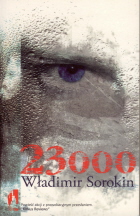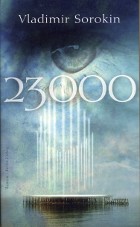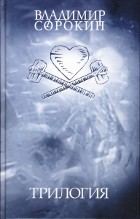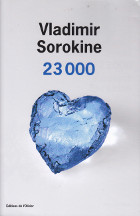Vladimir Sorokin
23,000
Proposal
Published by
- Zakharov Publishers, Moscow
- Wydawnictwo W.A.B., Warsaw
- Berlin Verlag, Berlin
- New York Review of Books, New York
- Éditions de l’Olivier, Paris
- Gondolat Kiadó, Budapest
- Alfaguara, Madrid
Vladimir Sorokin’s novel „23,000“ is the third and concluding book in his „Ice“ trilogy that began with the novels „The Ice“ and „The Path of the Bro.“
The Brotherhood of the Light has almost realized its dream. Soon the 23,000 brothers and sisters, who emerged from the Eternal Light and slipped into human bodies in the primordial time, will gather together in a great circle and regain their original form as beings of light. The cosmic error will be corrected, and the Earth—that corporeal Hell of sexuality and violence—can find its way back to an eternal existence.
Only the humans stand in their way, or, to be more precise, the „empty shells“ who survived the blow of an ice hammer on the chest, which is the only way that a „living heart“ can be detected. They know too much, and are starting to interact with one another on the Internet in an attempt to join forces in the battle against the Brotherhood. The Brotherhood sets a trap for them and lures them to the Chinese city of Guangzhou, where they are interned in a camp, and forced to make ice hammers from the last remnants of the Tungus Meteorite. The two main protagonists of the novel, the Russian-American Olga and the Swede Björn are among the prisoners.
The Brotherhood is running out of time. The mass murders of the „machines of flesh“ who did not survive the ice-hammer test can no longer be covered up with the secret police methods that could be applied under Stalin and the Nazi-s, and there is a danger that a „metaphysical hole“ will be created. On top of this, Khram—who became the guardian of the secrets of the end-of-time sect after Bro’s death—is old and weak, and does not have much longer to live. She is being aided by Misha, the small, mentally handicapped boy, to whom the reader was introduced in the concluding scene of „The Ice.“ Misha has since earned the name Gorn. His strong heart is helping Khram track down the remaining unlocated Brothers and Sisters on Earth, including a professional killer and a number of other unusual characters.
The dream has come true, and light circles are being formed all over the world. This is just in time for the Brotherhood, because the prisoners in the camp in Guangzhou have risen up in revolt. Only Olga and Björn survive the suppression of the uprising. Fate itself leads them to the Brotherhood. The select 23,000 gather together in a great circle on an island covered with white marble plates in the middle of the ocean . During the ceremony, Olga and Björn are seen holding two babies—also among the chosen—in their arms. They cannot avoid being mesmerized by the strength of the faith that emanates from the circle of the Brotherhood. In parting, sister Ze tells Olga that „there is no such thing as ‚your‘ happiness and ‚our‘ happiness. There is always only one happiness. One happiness for everyone.“
When the great circle begins to speak and pronounces its verdict, the Earth shutters. Shaken out of their trance, Olga and Björn see that the circle is now one of 23,000 corpses. The realization that God created everything that surrounds them on Earth descends on them in a sort of enlightenment. They want to pray to Him, but words fail them, and they decide to go in search of humans who can teach them how to pray.
Were it not for his brilliant stylistic experiments and etudes that strongly recall the Sorokin of the period of „Sky-blue Bacon“: his replication of the speech of the insane, the tale of the contract killer in the style of a roman noir, the excursion into the fascination with machines that was typical for the literature of the 1920s, Sorokin’s novel „23,000“ could almost be classed as a thriller because of the breathtaking tension that he creates with action that defines countless fates, taking place in Russia, China, Israel, Switzerland, and the U.S.A..
What catches the reader’s attention in Sorokin’s trilogy is that its protagonists are not the members of the sect of the Brotherhood, but rather the soulless „machines of flesh.“ No one other than humans can solve the world’s problems. Olga and Björn, however, can hardly be considered average humans, because they believe too strongly in justice and are attracted too much by ideals. As one of the Russian critics theorizes, the epic of the Brotherhood of the Light is „only a play that has been staged so that people can learn something important about themselves.“ The idea that man can escape earthly existence and corporeality has been shown to be an illusion. What remains is the cosmic loneliness of a mankind that will remain alone with itself and its problems unless it can find a common God, but not necessarily the one fought over by theologians and religious militants. This is just one of the many possible interpretations of this multifaceted novel that plays on current fantasies about the outcome of time.




